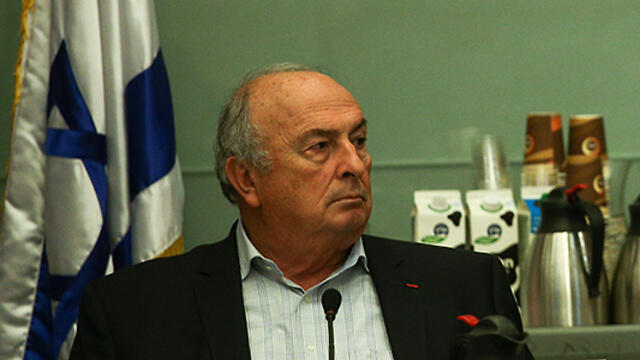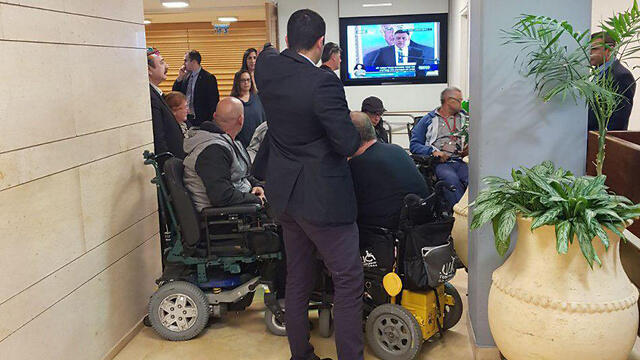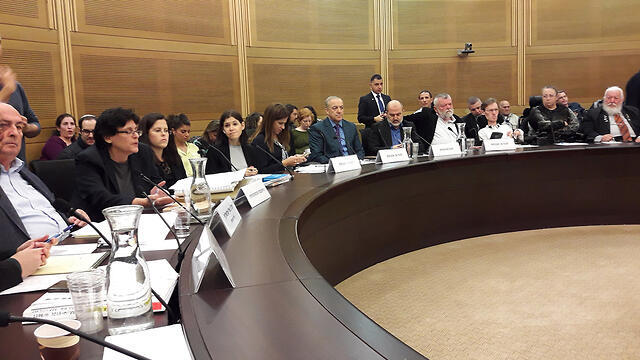Getting your Trinity Audio player ready...
Disabled organizations said Tuesday they would continue their protest after the Knesset passed a bill to raise disability benefits they say is insufficient.
Some 20 disabled persons, led by the "Disabled Panthers" group, barricaded themselves in the Knesset building after the plenum concluded its session and threatened to remain there indefinitely.
Protesters also blocked the entrance to the plenum and the entrance and exit to the Knesset cafeteria intermittently, with a handful of them declaring a hunger strike.
The bill that sparked the disabled organizations' ire nevertheless passed its final readings in the plenum, with 84 MKs voting in favor and none abstaining or objecting.
Chairperson of the "Disabled Protest Headquarters" organization Naomi Moravia ,whose group was party to the agreement reached with the government last September—and violated with the passage of the law—said it "encourages renewing the struggle."
"The Treasury's Budgets Department mistakenly thought they came down from Mount Sinai with the Tablets of Stone," Moravia added. "With this law passing, the Disabled Protest Headquarters considers itself extricated from its guarantees, and will push for improvements—this time uncompromisingly."
Eyal Cohen, leader of the Disabled Panthers—whose members left the Knesset's plenum in protest—said that, "Starting today, the disabled protest will escalate in severity. We'll reach the homes of every minister and MK and mercilessly block them for prolonged periods of time."
"The people of Israel and their elected representatives will soon see what the disabled can do in the most social and just struggle, and it is a shame we reached this point," Cohen said.
The bill's approval was preceded by a fiery debate in the Knesset's Welfare Committee Sunday, in which it was decided the benefits will be raised by a total of NIS 4.34 billion. While the sum is NIS 140 million more than what the disabled were promised, due to calculation errors it remains insufficient to meet obligations according to the allotted timetables.
In addition, the government's promise to link benefits to the average wage was partially violated, with linkage only beginning in 2022 as per the bill.
Seven MKs nevertheless voted in favor of the bill in the committee's hearing, with MK Karin Elharar (Yesh Atid) abstaining and MK Ilan Gilon (Meretz) absent from the vote as a protest measure.
"The sum isn't enough to achieve what we all wanted, but we have still reached considerable gains and significant raises," Committee Chairman MK Eli Alaluf (Kulanu) said. "We'll continue on, and the struggle will not be over until the disabled receive their just due."
The committee's decision was met with outcry on the part of the disabled, some of whom stormed out of the hall. One angry protester interjected into the debate and shouted, "If we don't have a life, neither will you. They're pushing us to suicide."
Another activist, Ofer Sofer, was removed from the hall after he called the MKs "Nazis."
One of the promises contained in the September agreement but violated by the law's current promulgation concerned the disregard (the threshold before supplementary income for the disabled is cut), which today stands at NIS 2,800.
The September agreement stipulated the disregard will be raised to NIS 4,300, with an option to further increase it to the level of the minimum wage. The bill, however, set it at only NIS 3,700.
5 View gallery


The original agreement said benefits will be raised to NIS 4,300 monthly
(צילום: דוברות ההסתדרות)
"Increasing disability benefits while keeping the disregard low created a negative incentive and a major block on people with disabilities seeking gainful employment," said Oren Helman of the "Equal Chance" Facebook page for integrating such people in employment and society.
"A disregard lower than minimum wage is akin to telling people with disabilities to sit at home and not work, because they'll lose money by doing so starting at a very low level," he elucidated.
The only disabled protest organization that welcomed the bill was "Disabled, Not Half a Person." The organization's chairman Alex Friedman said, "Our historic achievement, on which we've toiled for the past three years, will soon become law and will indubitably significantly improve the lives of 400,000 disabled people and their families."
"There is, however, a feeling of a fly in the ointment with the last minute changes put in," Friedman added, "which should be aborted. Whether it happens today or soon, disability benefits must reach NIS 4,000 as per the government's commitment, as a first, moral step to setting benefits at minimum wage levels."
5 View gallery


Welfare Committee Chairman MK Alaluf said that the agreement nevertheless constituted a significant step towards righting past wrongs
(צילום: אוהד צויגנברג)
Chairman of the Knesset's Welfare Committee MK Alaluf replied to claims made by the disabled organizations and said, "A significant reform of disability benefits was carried out today, one that corrects previous injustices."
"I wish to appeal to the disabled and tell them that their struggle is one of the most just and glorious struggles seen here. You are paragons of active citizens fighting for their rights and for the country in which you live," Alaluf added. "Now is the time to reap the fruits of that struggle, even if not all of them, and to recognize this momentous achievement."
Amihai Attali and Rotem Elizera contributed to this report.




